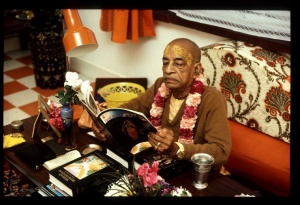SB 10.44.38: Difference between revisions
m (1 revision(s)) |
No edit summary |
||
| Line 1: | Line 1: | ||
{{info | {{info | ||
|speaker= | |speaker=Śukadeva Gosvāmī | ||
|listener=King | |listener=King Parīkṣit | ||
}} | }} | ||
[[Category:Srimad-Bhagavatam - Canto 10 Chapter 44]] | |||
[[Category:Bhagavatam Verses Spoken by Sukadeva Gosvami - Vanisource|104438]] | |||
<div style="float:left">'''[[Srimad-Bhagavatam]] - [[SB 10|Tenth Canto]] - [[SB 10.44: The Killing of Kamsa|Chapter 44: The Killing of Kaḿsa]]'''</div> | |||
<div style="float:right">[[File:Go-previous.png|link=SB 10.44.37]] '''[[SB 10.44.37]] - [[SB 10.44.39]]''' [[File:Go-next.png|link=SB 10.44.39]]</div> | |||
{{RandomImage}} | |||
{{SBnotice}} | |||
==== TEXT 38 ==== | ==== TEXT 38 ==== | ||
<div | <div class="verse"> | ||
taṁ samparetaṁ vicakarṣa bhūmau | :taṁ samparetaṁ vicakarṣa bhūmau | ||
harir yathebhaṁ jagato vipaśyataḥ | :harir yathebhaṁ jagato vipaśyataḥ | ||
hā heti śabdaḥ su-mahāṁs tadābhūd | :hā heti śabdaḥ su-mahāṁs tadābhūd | ||
udīritaḥ sarva-janair narendra | :udīritaḥ sarva-janair narendra | ||
</div> | </div> | ||
| Line 17: | Line 22: | ||
==== SYNONYMS ==== | ==== SYNONYMS ==== | ||
<div | <div class="synonyms"> | ||
''tam''—him; ''samparetam''—dead; ''vicakarṣa''—dragged; ''bhūmau''—along the ground; ''hariḥ''—a lion; ''yathā''—as; ''ibham''—an elephant; ''jagataḥ''—all the people; ''vipaśyataḥ''—as they looked on; ''hā hā iti''—"Oh, oh!"; ''śabdaḥ''—the sound; ''su-mahān''—mighty; ''tadā''—then; ''abhūt''—arose; ''udīritaḥ''—spoken; ''sarva-janaiḥ''—by all the people; ''nara-indra''—O ruler of men (King Parīkṣit). | |||
</div> | </div> | ||
{{SBcollapse}} | |||
==== TRANSLATION ==== | ==== TRANSLATION ==== | ||
<div | <div class="translation"> | ||
As a lion drags a dead elephant, the Lord then dragged Kaṁsa's dead body along the ground in full view of everyone present. O King, all the people in the arena tumultuously cried out, "Oh! Oh!" | As a lion drags a dead elephant, the Lord then dragged Kaṁsa's dead body along the ground in full view of everyone present. O King, all the people in the arena tumultuously cried out, "Oh! Oh!" | ||
</div> | </div> | ||
| Line 31: | Line 36: | ||
==== PURPORT ==== | ==== PURPORT ==== | ||
<div | <div class="purport"> | ||
Śrīla Viśvanātha Cakravartī explains that many people in the audience thought Kaṁsa had simply been knocked unconscious when thrown from the lofty dais. Therefore Lord Kṛṣṇa dragged his corpse so everyone would realize that the evil King was indeed dead. Thus the exclamation hā hā indicates how surprised the people were that the King was suddenly dead and gone. | Śrīla Viśvanātha Cakravartī explains that many people in the audience thought Kaṁsa had simply been knocked unconscious when thrown from the lofty dais. Therefore Lord Kṛṣṇa dragged his corpse so everyone would realize that the evil King was indeed dead. Thus the exclamation ''hā hā'' indicates how surprised the people were that the King was suddenly dead and gone. | ||
The audience's astonishment is also mentioned in the Viṣṇu Purāṇa: | The audience's astonishment is also mentioned in the ''Viṣṇu Purāṇa:'' | ||
:tato hāhā-kṛtaṁ sarvam | :''tato hāhā-kṛtaṁ sarvam'' | ||
:āsīt tad-raṅga-maṇḍalam | :''āsīt tad-raṅga-maṇḍalam'' | ||
:avajñayā hataṁ dṛṣṭvā | :''avajñayā hataṁ dṛṣṭvā'' | ||
:kṛṣṇena mathureśvaram | :''kṛṣṇena mathureśvaram'' | ||
"Then the entire arena became filled with cries of astonishment as the people saw that the master of Mathurā had been contemptuously killed by Kṛṣṇa." | "Then the entire arena became filled with cries of astonishment as the people saw that the master of Mathurā had been contemptuously killed by Kṛṣṇa." | ||
</div> | </div> | ||
__NOTOC__ | </div> | ||
</div> | |||
<div style="float:right">[[File:Go-previous.png|link=SB 10.44.37]] '''[[SB 10.44.37]] - [[SB 10.44.39]]''' [[File:Go-next.png|link=SB 10.44.39]]</div> | |||
__NOTOC__ | |||
__NOEDITSECTION__ | |||
Revision as of 11:08, 23 May 2021

A.C. Bhaktivedanta Swami Prabhupada
Please note: The synonyms, translation and purport of this verse were composed by disciples of Śrīla Prabhupāda
TEXT 38
- taṁ samparetaṁ vicakarṣa bhūmau
- harir yathebhaṁ jagato vipaśyataḥ
- hā heti śabdaḥ su-mahāṁs tadābhūd
- udīritaḥ sarva-janair narendra
SYNONYMS
tam—him; samparetam—dead; vicakarṣa—dragged; bhūmau—along the ground; hariḥ—a lion; yathā—as; ibham—an elephant; jagataḥ—all the people; vipaśyataḥ—as they looked on; hā hā iti—"Oh, oh!"; śabdaḥ—the sound; su-mahān—mighty; tadā—then; abhūt—arose; udīritaḥ—spoken; sarva-janaiḥ—by all the people; nara-indra—O ruler of men (King Parīkṣit).
Translation and purport composed by disciples of Śrīla Prabhupāda
TRANSLATION
As a lion drags a dead elephant, the Lord then dragged Kaṁsa's dead body along the ground in full view of everyone present. O King, all the people in the arena tumultuously cried out, "Oh! Oh!"
PURPORT
Śrīla Viśvanātha Cakravartī explains that many people in the audience thought Kaṁsa had simply been knocked unconscious when thrown from the lofty dais. Therefore Lord Kṛṣṇa dragged his corpse so everyone would realize that the evil King was indeed dead. Thus the exclamation hā hā indicates how surprised the people were that the King was suddenly dead and gone.
The audience's astonishment is also mentioned in the Viṣṇu Purāṇa:
- tato hāhā-kṛtaṁ sarvam
- āsīt tad-raṅga-maṇḍalam
- avajñayā hataṁ dṛṣṭvā
- kṛṣṇena mathureśvaram
"Then the entire arena became filled with cries of astonishment as the people saw that the master of Mathurā had been contemptuously killed by Kṛṣṇa."